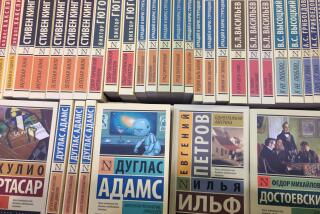Teachers’ Glasnost Generates a Lesson of Cooperation
- Share via
When the chaos of the new school year abates, Jane Dill will tell her students at El Modena High School in Orange what she did this summer.
It wasn’t as adventurous as riding a camel through the Gobi Desert--and falling off--as she did four years ago. Nor was it as emotionally draining as traveling to South Africa, as she has also done. But it was something she says she will remember for years to come.
In August, Dill and 17 other U.S. teachers spent two weeks trading educational theories with 20 teachers from the Soviet Union. The seminar, held at Hampshire College in Amherst, Mass., was sponsored by Educators for Social Responsibility. Along the way, they also learned some telling lessons about how the Cold War has shaped the lives and the educational practice of participants from both countries.
It took a while, Dill said, for the Soviet teachers to open up. In the beginning, she said, “they were very courteous, very mannerly . . . and very restrained .”
To break the ice, the group spent a few hours exploring the images and assumptions each group held about the other.
The Soviet teachers said Americans are a people who smile too much and for too little reason. The Americans found they nurtured an uglier stereotype: The Soviet aim, they said, is to conquer the world.
They moved on to examine one another’s textbooks:
“The lessons of the Korean war,” wrote V.K. Furaev in a Soviet textbook, “Contemporary History,” “bear witness to the fact that a selfless struggle of the people to defend their fatherland, the unity and the solidarity of the Socialist countries . . . as well as the support from peace-loving countries for the victims of aggression . . . can foil the plans of international reactionaries.”
The ideological bombast of the Soviet text came as no surprise to the Americans, Dill said. And Soviet teachers were quick to point out that their history texts are being revised. What shocked the Americans, Dill said, was something they found in one of their own history books.
The text was Burton F. Beers’ “World History: Patterns of Civilization,” published in 1984 . In a chapter on totalitarian states, with Adolf Hitler’s picture on the first page, the author had lumped the Bolshevik Revolution of 1919 together with fascism in Italy and the rise of Nazi Germany.
Dill said the U.S. teachers read the chapter without a second thought. But Soviet teachers, she said, immediately objected to the author’s assumption that their revolution could be compared to Nazi Germany or any of the other dismal episodes chronicled in the chapter.
“When you’re sitting there and reading something like this with a member of the country sitting right next to you,” Dill said, “you have a whole different perspective.”
Dill, 54, a grandmother of three who lives in Orange, said she started her professional career as a social worker, but eventually switched to teaching.
“When I was a social worker, I saw people with so many problems that I felt trying to cure problems is not as effective as trying to prevent them,” she said.
Dill--who has traveled widely in Europe, Africa, Central America and China--said she was intrigued by the education seminar as a chance to meet teachers from another culture. After her experience this summer, she said, she is eager to see their land for herself.
“I haven’t been to Russia yet,” she said. “That’s my next dream.”
A 12th-grade teacher of economics and psychology, Dill said she hopes some of the lessons she learned this summer will encourage her students to take a more complicated view of the Soviet Union, its economy and its people.
“They think of capitalism as being good for everybody and communism as being bad for everybody,” she said. “So they tend to think in extremes.”
Dill well understands their feelings.
“I lived through the McCarthy era,” she said. “So I have certainly been through the whole time of propaganda about ‘a communist under every bed.’ ”
But this is a different era, according to Dill. The United States is more economically dependent on other countries than it was when she was a student, and it is her duty, she said, to prepare her students for that.
“We can no longer be provincial; we can no longer just think about what’s happening in the United States,” Dill said. “We have to be concerned about what’s happening in other parts of the world.”
More to Read
Sign up for Essential California
The most important California stories and recommendations in your inbox every morning.
You may occasionally receive promotional content from the Los Angeles Times.













